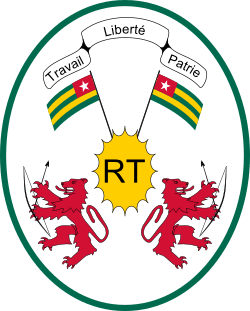Action Committee for Renewal
The Action Committee for Renewal (French: Comité d'Action pour le Renouveau, CAR) is an opposition political party in Togo. Dodji Apévon has led the party since 2008; previously it was led by Yawovi Agboyibo from 1991 to 2008.
 |
|---|
| This article is part of a series on the politics and government of Togo |
|
Parliament
|
|
Administrative divisions |
|
|
|
History
The Front of Associations for Renewal, which was led by Agboyibo, was transformed into the CAR in April 1991.[1] In the February 1994 parliamentary election, the CAR initially won 36 seats, more than any other party, including the ruling Rally of the Togolese People (RPT), which won 35 seats.[2][3] The CAR and its ally, the Togolese Union for Democracy (UTD), proposed Agboyibo as Prime Minister.[2] However, results in three constituencies were subsequently invalidated, depriving the CAR of two seats and the UTD of one,[2][4] and the two parties decided to boycott the National Assembly as a result. After UTD leader Edem Kodjo was named Prime Minister, the CAR chose not to participate in his government, saying that the UTD had violated the two parties' agreement; however, after the partial elections for the invalidated seats were delayed, the CAR decided to end its boycott of the National Assembly.[2] It announced another boycott on November 7, 1994, over the issue of the partial elections,[5] but eventually ended it again on August 22, 1995, after an agreement was reached with the government on the creation of an independent electoral commission.[6] One deputy left the CAR in April 1996, and another in October 1996, reducing its number of seats to 32. The party boycotted a National Assembly vote concerning the Constitutional Court in December 1996, and another vote in September 1997 concerning the adoption of an electoral code; in the latter case, it did so to protest the withholding by the government of a report by a European Union mission about Togo's election process.[2]
The CAR boycotted the March 1999 parliamentary election and the October 2002 parliamentary election. Agboyibo was the party's candidate in the June 2003 presidential election, taking third place with 5.1% of the vote. The CAR supported Emmanuel Bob-Akitani of the Union of Forces for Change in the presidential election of 24 April 2005, in which he won 38.1% of the vote.
Agboyibo was appointed as Prime Minister of Togo in September 2006 at the head of a national unity government in preparation for a parliamentary election.[1] In this election, which was held in October 2007, the party won four out of 81 seats;[7][8] it won all three seats in Yoto Prefecture along with one seat in Vo Prefecture.[8]
The CAR held an ordinary congress in October 2008, and at the congress Agboyibo chose to step down as the President of CAR; he was replaced by Dodji Apévon.[9]
References
- "Togo : Faure Gnassingbé nomme un Premier ministre" Archived September 15, 2007, at the Wayback Machine, infosplusgabon.com, September 16, 2006 (in French).
- Africa South of the Sahara 2004 (2003), Routledge, pages 1,145–1,146.
- "Mar 1994 - Opposition election victory", Keesing's Record of World Events, Volume 40, March, 1994 Togo, Page 39897.
- "Apr 1994 - Election controversy New Prime Minister", Keesing's Record of World Events, Volume 40, April, 1994 Togo, Page 39946.
- "Nov 1994 - Parliamentary boycott", Keesing's Record of World Events, Volume 40, November, 1994 Togo, Page 40266.
- "Aug 1995 - End of CAR parliamentary boycott", Keesing's Record of World Events, Volume 41, August, 1995 Togo, Page 40668.
- "Le RPT remporte les premières élections pluralistes" Archived 2008-01-24 at the Wayback Machine, Republicoftogo.com, October 30, 2007 (in French).
- Text of Constitutional Court decision (final election results) Archived 2007-11-29 at the Wayback Machine, October 30, 2007 (in French).
- "Agboyibo n’a pas dit son dernier mot", Republicoftogo.com, October 19, 2008 (in French).